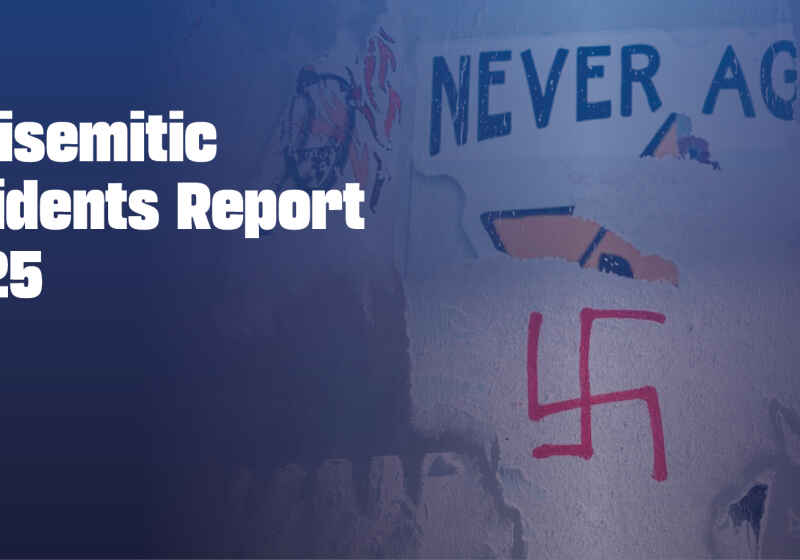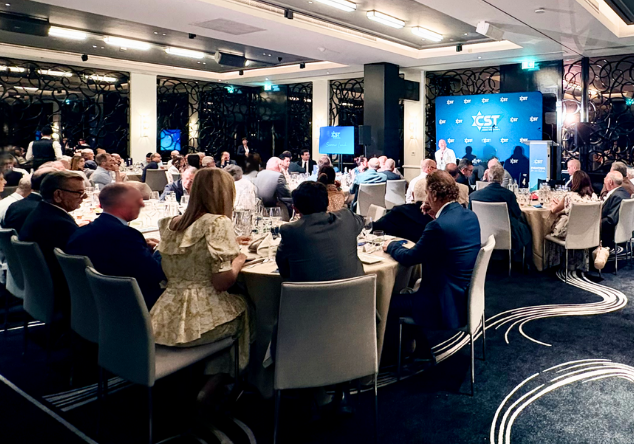CST Blog
The BNP, anti-fascism today and the Jewish community
5 October 2010
CST and the PCAA Foundation held our third party conference fringe meeting on Sunday, at Conservative party conference. The panel featured Andrew Rosindell MP, Councillor Robert Rams, James Bethell of the 'Nothing British about the BNP' campaign and Mark Gardner from CST. Previous fringe events had included contributions from Tom Brake MP and Gordon Birtwistle MP of the Liberal Democrats; Labour's John Mann MP and Margaret Hodge MP; Nick Lowles of Hope Not Hate and Searchlight; and Dave Rich from CST.
All three fringes were 'standing room only' and heard engaging and insightful discussions about how the BNP were defeated in the May elections, the arrival of the English Defence League and what the future holds for the far right.
Below is the full text of the speech given by CST's Mark Gardner and Dave Rich at the fringe events.
The experiences of fighting the BNP in elections in Burnley, Barking and various other places around the country show just how much the traditional model of anti-fascism has changed over the years. When the BNP won their first ever council seat, in a by-election in Millwall, East London, in 1993, their victory was greeted by a group of skinheaded BNP activists giving Nazi salutes and chanting Rights for Whites like a football crowd outside the election count, in scenes we would be unlikely to see from the BNP today.
At this time, you could see the BNP standing on the corner of Brick Lane, selling their antisemitic Holocaust denial rag, Holocaust News, with its headlines such as Holocaust story an evil hoax and How Zionists murder truth. So, when people today get complacent about the BNP having failed at the ballot box this year, it is our responsibility to stress just how far the party has come in under twenty years: from being a gang of antisemitic neo-Nazi thugs to winning seats in the European Parliament, appearing on Question Time and getting invited to the Queens Garden Party.
The BNP have made some significant changes to achieve their current level of success, and while those changes may well be mostly tactical and cosmetic rather than anything more deep-rooted, they have nevertheless required anti-fascist campaigning to also change in order to stay relevant and effective.
The Jewish history of anti-fascism in this country goes back to the 1930s and has its own foundation myth: the Battle of Cable Street, at which Jews and others in Londons East End stopped Mosleys Blackshirts from marching. It continued after the war with the 43 Group, formed by Jewish ex-servicemen who returned from fighting fascism in the war, only to find Mosleys fascists active once again on British streets. In the 1960s, the same tactics of physical confrontation were used by the 62 Group against Colin Jordans National Socialist Movement. On one famous occasion in July 1962 this led to a riot in Trafalgar Square, when Jordan tried to address a crowd while standing in front of a large banner which read: Free Britain from Jewish Control.
Jewish establishment organisations such as the Board of Deputies historically eschewed these more militant, and often illegal, approaches to anti-fascism, concentrating instead on the important work of lobbying and campaigning against the far right. A case in point is the contribution the Board of Deputies made to the creation of the Race Relations Act in 1976. CST today embodies the combination of these two traditions, providing physical security for the Jewish community, now solely through legal means; doing the necessary work of researching, investigating and explaining the problems of antisemitism and racism; and helping to develop better policing and prosecution of all hate crimes, both in Britain and in other countries in the EU and OSCE regions.
Meanwhile, the strategy and tactics of the far right have changed considerably over the same period. The BNPs focus on elections at the expense of marches and public rallies has left some of the older forms of anti-fascist campaigning looking increasingly obsolete. While public protests may still have their place, anti-fascism has had to adapt to this new electoral challenge.
Nowadays, anti-fascism is best represented by the work of Hope Not Hate and the Nothing British About the BNP campaigns. They are open, legal, engaging, thoroughly mainstream and they emphasise our common values and shared interests. They do not shy away from acknowledging and addressing the issues that the BNP seek to manipulate but they do so without engaging the BNP directly, without adopting their language and without normalising the presence of the BNP.
Because the battle against the BNP now takes place almost exclusively via the ballot box, it automatically draws in all three mainstream parties, and community organisations like CST: You cannot simply ignore the BNP as a fringe irrelevance, if they are sitting in the same council chamber as you, or representing your community in the European Parliament. You have to find other ways to combat their presence and reduce their influence, but without normalising a vote for the BNP. We should never forget that when voters turn to the BNP, it represents something profoundly different from when they turn to one of the other mainstream parties because the BNP is outwith the democratic norm. It seeks to divide our countrys citizens and turn them against each other. Having been neo-Nazi it now claims to be something else, but whatever ideology it claims, it most certainly does not stand for British values. Nor is it enough to simply call the BNP Nazis; anti-fascist messaging needs to be much more sophisticated than that. The change in the far rights public attitude to Jews is a case in point.
The Jewish community in Britain has changed a great deal since the days of Cable Street and Oswald Mosley. While British Jews remain a minority community in Britain, on the whole they are no longer a visibly immigrant community, and have left the neighbourhoods where Jews faced hostility in the past as newcomers competing for jobs and housing; and where they were the primary target for fascist violence. This means that Jews are no longer a plausible target for the far rights scapegoating of immigrants for wider social and economic problems.
Nick Griffin, even though he has a personal history of Holocaust Denial, realised very early on in his time as BNP leader that an openly antisemitic, neo-Nazi party is never going to win significant numbers of votes in this country. So he has tried to move the BNP away from open, public antisemitism and Holocaust Denial, although as we saw on Question Time, he is personally evasive whenever he is actually pinned down on these issues. Instead, Muslims are now the primary targets of the far rights violent and rhetorical assaults. Indeed, Muslims are often attacked in the same terms that Jews have been attacked previously: that they cannot or will not integrate; that they are pushing out indigenous British people; that they are part of an international conspiracy that threatens to overwhelm and destroy British society; and so on.
This is not to say that antisemitism and Islamophobia are the same, because they are not; or to repeat the superficial cliché that Muslims are the new Jews, which also misses the point. Rather, it is to recognise the similarities in the types of hateful and divisive politics directed by the far right at Jews in the past, and at Muslims today. So while the BNPs antisemitic legacy should not be ignored and can often still be found just beneath the surface, our messaging today needs to find a balance between reminding people of this neo-Nazi heritage, while tackling their contemporary racism and bigotry against other minorities head-on.
Some in the BNP imagined that their Islamophobic campaigns would resonate with the Jewish community, exploiting tensions from the Israeli/Palestinian conflict. This should tell you everything you need to know about the BNP: they are opportunists who are always looking to divide communities and set British citizens against each other. In the 2008 London Assembly elections, the BNP even targeted areas of London with large Jewish communities, using election literature featuring Pat Richardson, a BNP councillor who is Jewish. The Jewish communitys response to this was the Your Voice or Theirs campaign, led by the Board of Deputies and with support from CST and other Jewish organisations. The campaign had three aims: firstly, to encourage British Jews to vote; secondly, to remind them of the antisemitic past and present of Nick Griffins BNP; and thirdly, to warn people not to fall for their anti-Muslim rhetoric. This campaign was a success, and showed that the Jewish community had not lost its anti-fascist sensibilities. In the London wards with the largest Jewish populations, turnout was high and the BNP vote was particularly poor.
Part of Nick Griffins strategy to change the BNPs image has been to marginalise the neo-Nazi skinheads and the racist street thugs that have traditionally been part of the BNP and the NF before it, either by forcing them out of the BNP, or more often just by keeping them away from public view. This process, combined with the BNPs decision to leave behind street activity with its negative imagery of skinheads and thugs corralled behind lines of riot police, has left a vacuum which has been filled by more action-orientated groups. Some of these, such as the British Peoples Party, have been a breeding ground for a worrying growth in neo-Nazi terrorism, which is a subject for another time, but is a threat which must be taken seriously. But the best-known group to fill this vacuum has been the English Defence League.
The EDL have taken the BNPs switch from antisemitism to Islamophobia to an extreme. They have even managed to attract a handful of Jewish supporters who attend EDL demonstrations bearing the Israeli flag, despite the fact that known neo-Nazis have been seen at various EDL rallies. These IsraeIi flags are used as a provocation to the Muslims who are the EDLs main target. The EDL have been consistently condemned by CST and by other mainstream Jewish bodies; we have been involved in anti-fascism and anti-racism for long enough to recognise them for what they are, and we find their hijacking of the Israeli flag repulsive. But it is a sign of how polarised attitudes have become around antisemitism, Islamist extremism and pro- and anti-Zionism, that there are a small number of British Jews - and we should remember it is a very small number indeed who misguidedly think that they belong in the same trench as the EDL. In fact the EDL only bring the same politics of hatred and division as the BNP, a sort of politics from which Jewish communities never benefit. They pose a real danger to social cohesion and are not going to go away. But this polarisation and the radicalisation of the political atmosphere that it represents, is another reason why it is so important to build a strong democratic centre ground, to defend all of our communities against the influence of the far right.
Read More

Antisemitic Incidents Report 2025
11 February 2026

Antisemitic Incidents Report January-June 2025
6 August 2025

CST Summer Lunch 2025
25 June 2025